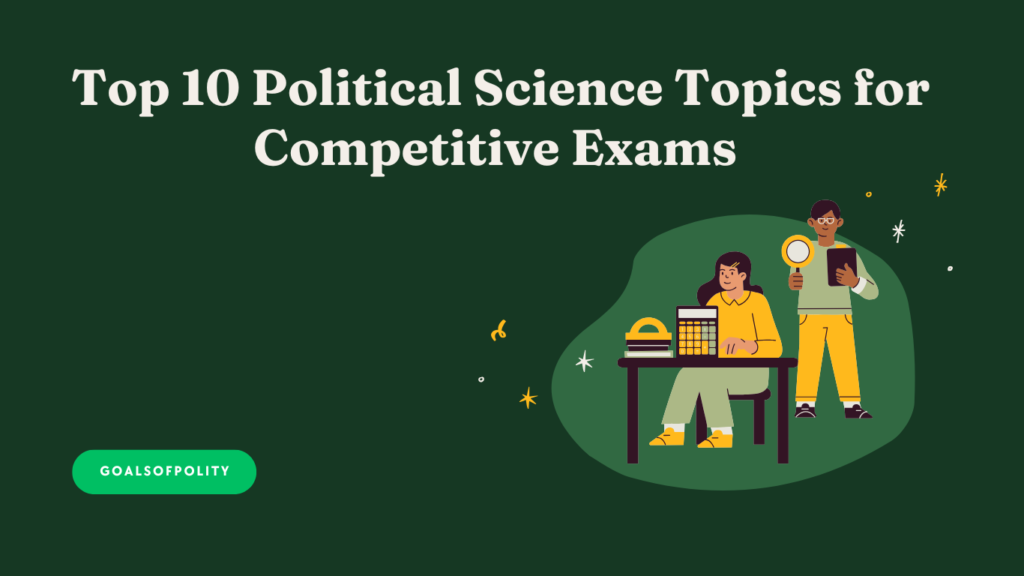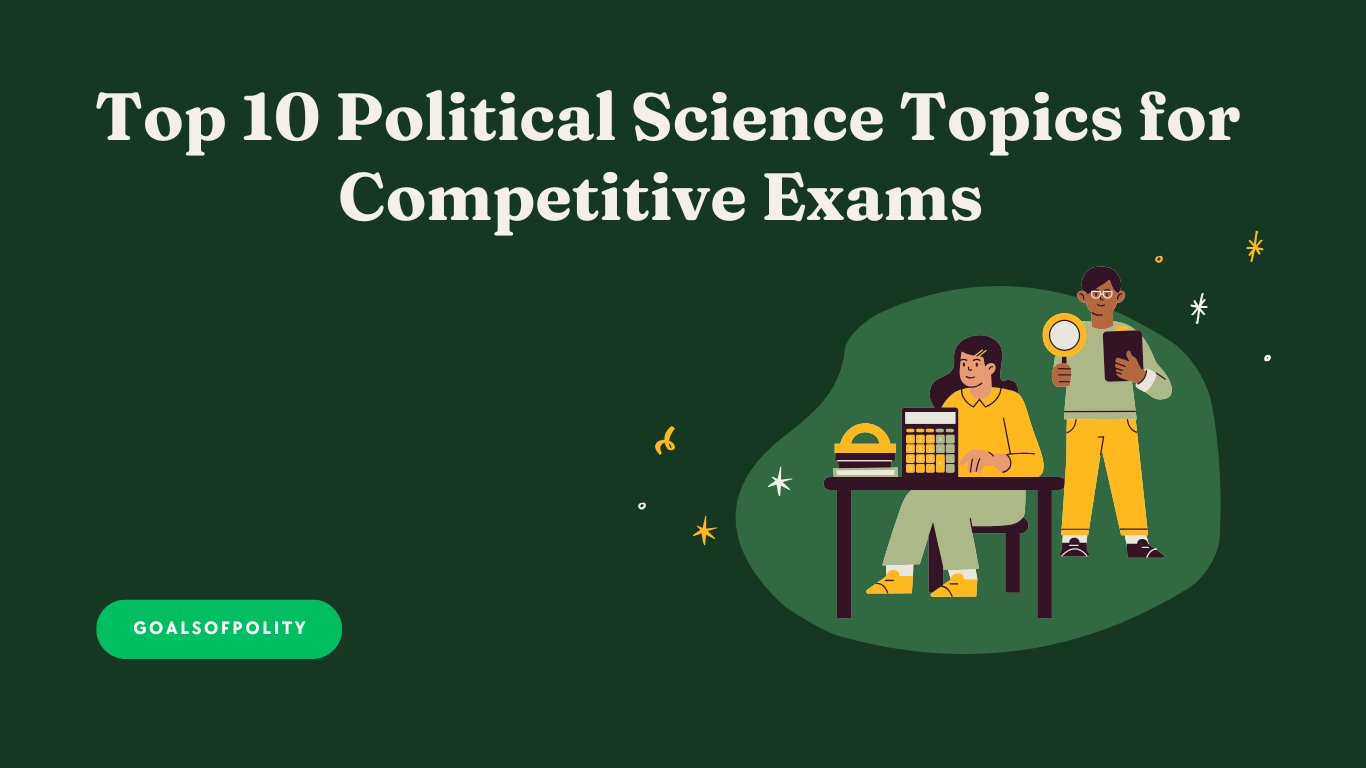
Table of Contents
Political Science is an important subject for students preparing for competitive exams like UPSC, State Public Service Commission, UGC-NET, and other civil service exams. A deep understanding of the key concepts, theories, and thinkers is a must to score good marks in this subject. In this post, we will outline the top 10 topics of Political Science that every candidate must cover well to excel in their exams.
1. Indian Constitution:
The Constitution of India lays the foundation of the Indian political system and governance. Candidates should focus on:
- Fundamental Rights and Duties
- Directive Principles of State Policy
- Amendments and their significance (especially 42nd, 73rd, and 74th amendments)
- Structure and functioning of Parliament, Executive, and Judiciary
- Emergency provisions, federalism, and the relationship between the Centre and the States.
2. Political Theories and Ideologies:
Political ideologies such as liberalism, conservatism, socialism, Marxism, feminism, and postmodernism are important. These ideologies shape political thought and action globally. Candidates should study:
- The main proponents and their ideas (e.g., Karl Marx, John Locke, Rousseau).
- How these ideologies manifest in contemporary political systems.
- Critical analysis and comparison of different ideologies.
3. Indian Political Thought:
India’s rich history of political thought provides a wealth of material for competitive exams. Topics worth focusing on include:
- Ancient and medieval Indian thinkers like Kautilya, Manu and Barani
- Modern Indian political thinkers like Mahatma Gandhi, B.R. Ambedkar, Jawaharlal Nehru, Rabindranath Tagore, and M.N. Roy.
- Their influence on Indian society, politics, and constitution-making.
4. International Relations:
It is important to understand global politics and India’s role on the international stage. Major areas include:
- Theories of international relations (realism, liberalism, constructivism).
- Major international organizations (UN, WTO, IMF, World Bank).
- India’s foreign policy, relations with neighboring countries and major global powers (USA, China, Russia).
- Current global issues such as climate change, terrorism, nuclear proliferation, and regional conflicts.
5. Public Administration:
This subject is essential for students preparing for civil service. Focus on:
- Theories of public administration (e.g., Max Weber’s bureaucratic theory, new public management).
- Comparative public administration and governance models.
- Accountability, transparency, and e-governance in administration.
- Role of civil services in democracy.
6. Political Institutions in India:
Candidates should be well versed in the structure and functioning of political institutions in India, including:
- Role and powers of the President, Prime Minister, and Governors.
- Election Commission and electoral processes.
- Functioning of Panchayati Raj Institutions and local self-government.
- Role of the Supreme Court and judicial review.
7. Comparative Politics:
This subject involves comparing the political systems, institutions, and processes of different countries. Focus on:
- Different types of democracies (Parliamentary vs. Presidental systems)
- Federal vs. unitary systems of government
- Electoral systems and party systems across countries
- Case studies of political systems in the USA, UK, China, Russia.
8. Political Economy:
It is important to understand the relationship between politics and economics. Topics to be covered include:
- Concepts of capitalism, socialism, and mixed economies.
- Role of the state in economic growth and welfare.
- Globalization, liberalization, and their impact on Developing Countries.
- Theories of economic justice and distribution of resources.
9. Governance and Ethics:
Good governance is a major component of the civil services curriculum. Students should focus on:
- Concepts of accountability, transparency, and responsiveness in governance.
- Ethical issues in public administration and policymaking.
- Role of civil society, NGOs and media in governance.
- Corruption, its impact on governance, and measures to prevent it.
10. Contemporary Issues in Politics:
Finally, students should stay updated with current political developments. Areas to focus on include:
- Electoral reforms in India, judicial reforms, and police reforms.
- Challenges to democracy (populism, authoritarianism).
- Political debates related to social justice, reservation, and human rights.
- Politics of climate change, migration crisis and their political impact globally.
Conclusion:
Mastering these topics will not only increase your knowledge about political science but will also increase your chances of success in competitive exams. Remember, understanding the theoretical aspects of political science is important, but applying them to contemporary issues will give you an edge. Keep yourself updated with current affairs and include these topics in your preparation strategy.
By focusing on these 10 key areas, you can ensure that you have a good understanding of political science for your competitive exams. Good luck with your studies!
FAQs:
1. How can I choose relevant political science topics for competitive exams?
Follow the syllabus of the exam you are preparing for and prioritize topics of high importance like the Indian Constitution, International Relations, and Political Theories.
2. Which books are best for studying these topics?
For Indian topics, check out Indian Politics by M. Lakshmikanth. For Western political thought, books by Andrew Heywood are highly recommended.
3. Are contemporary issues important in political science exams?
Yes, questions on current events like global political shifts, actions of international organizations, and constitutional amendments are often included.
4. How much time should I devote to political science preparation?
If the subject is an important component of your exam, allocate at least 2-3 hours per day. Customize your study schedule to align with your strengths and weaknesses.
5. Can I use online resources for preparation?
Absolutely. Platforms like ‘GoalsofPolity’ provide structured notes, study material, and syllabi for Political Science aspirants.

